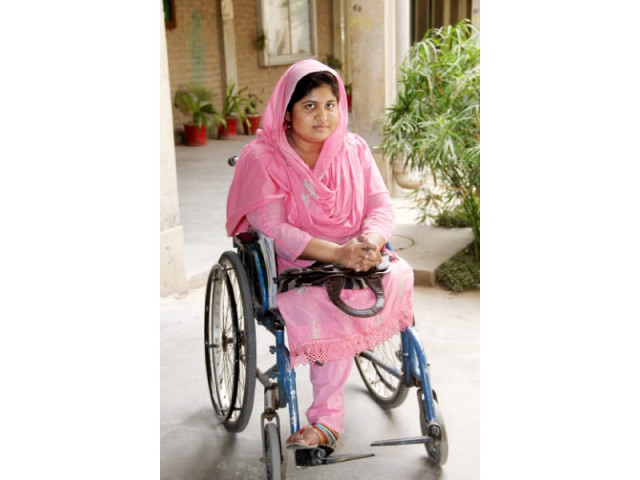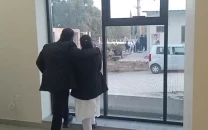Flying high: Conquering polio, with determination and a smile
Ayesha Talib on her journey from being a polio victim to an accomplished student.

Flying high: Conquering polio, with determination and a smile
As 20-year-old Ayesha Talib, a student of BSc Agriculture at the University of Agriculture Faisalabad, arrives at the university in a rickshaw, four of her closest friends help her into a wheelchair and push her toward her first class.
Ayesha is a victim of poliomyelitis but it is her smiling face that throws one off at first. “Yes, I suffer from polio but I am determined to pursue my career objectives,” she says.
The third child among four siblings, Talib hails from an underprivileged family of 19 members who all live in a five-marla house in Bhai Wala, a village on the outskirts of Faisalabad.
“Nobody in our village knew about the deadly affects of polio back in 1994 when I was born. Three years later, my legs became paralysed and my spine was affected.” She says her mobility was restricted to the extent that bowel movements became a painful ordeal.
Her father Talib Hussain, the sole bread winner for the family, was a watchmaker and had a small setup in the village. Despite the low income, Hussain, who has completed his matriculation, paid special attention towards educating his children.
Ayesha’s eldest sister completed her intermediate studies but could not study beyond that point due to financial constraints. Another sister completed her postgraduate studies in Urdu and teaches at a private school in the village. Her brother completed his matriculation and works with his grandfather’s catering business to help the family.
“Even though I could barely move, I begged my mother to send me to school,” Ayesha says. She was sent to a madrassa and later enrolled in grade three at the public primary school in the village.
“Words cannot begin to describe the humiliation I faced from grades three to five,” Talib says. “My classmates would call me names and make fun of me when I could not use the washroom.”
She says she spent most of her primary school days crying for hours on end.
“But my life changed when our neighbour told my father to send me to Sir Syed Special Children School in Millat Town from grade six onwards.”
She says she was provided medication to ease her debilitation and physiotherapy. The physiotherapist helped bring back limited mobility to her neck, back, shoulders and knees. “I was at the school until grade ten and I am forever grateful to the physiotherapist who changed my life.”
Talib obtained first division in matriculation and FSc (pre-medical).
She was offered a place in BSc Agriculture (horticulture) at the UAF under the physically challenged persons’ quota and won a Higher Education Commission scholarship.
Ayesha commutes more than 12 kilometres to her university everyday and loves every minute of it.
“It’s because of all my classmates. They helped me forget the agony of being physically challenged and changed me into a person who just couldn’t stop smiling...I am probably one of the happiest souls in this world.”
Ayesha says she wanted to study agricultural sciences because Pakistan’s economy was primarily agro-based. This area of study, she believes, can provide the tools to work towards alleviating poverty in the country.
“We should never be afraid of the hurdles in our path. Victims of polio or any other disability should not despair...we are masters of our fate and God helps us find ways to prove our worth.”
She says the trick is to smile at everyone as that helps her overcome a lot of problems in dealing with new people.
She says her days at the university will be the most memorable time of her life. “I feel at home with all my teachers and classmates. Here, I am just like any other person.”
She says many people think that studying agricultural sciences is only for men. These people forget that it is mostly women who till the fields, sow rice, vegetables and oil seeds; milk cows, buffaloes, goats and camels; and feed livestock. Similarly, it is mostly women who pick vegetables, fruits, cotton, rice, and other crops, she says. “I am proud of the fact that women are among the highest ranked students in the UAF.”
After graduation, Ayesha wants to work in the public sector and conduct research on horticultural sciences.
“As a polio victim, one of my priorities is to raise awareness regarding inoculation. People who sow seeds of suspicion regarding polio vaccines are playing with the lives of children. Such false notions end up depriving children of a fulfilling life,” she says.
Published in The Express Tribune, July 1st, 2014.



















COMMENTS
Comments are moderated and generally will be posted if they are on-topic and not abusive.
For more information, please see our Comments FAQ